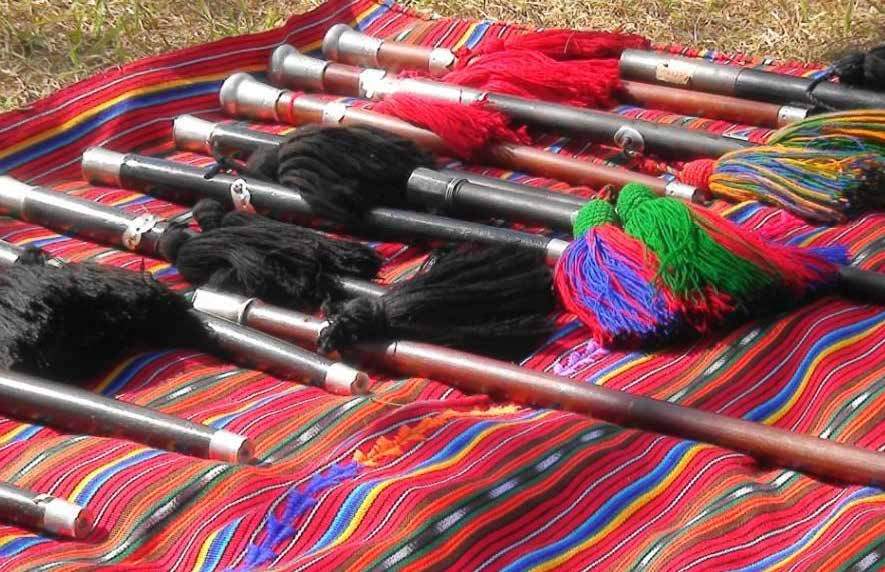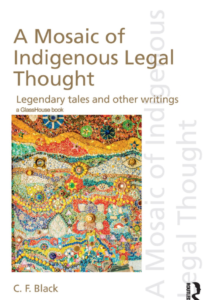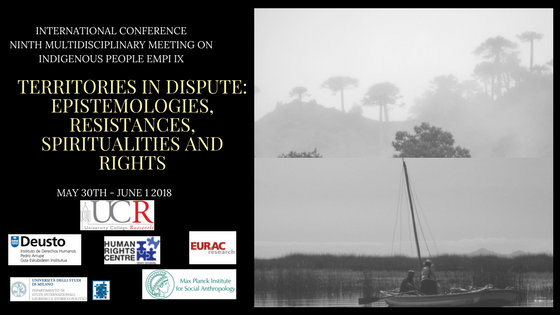Dear colleague, It’s a great pleasure to invite you to the Ninth Multidisciplinary Conference on Indigenous Peoples entitled “Territories in dispute: epistemologies, resistances, spiritualities and…
Asides
Call for papers on Southern Epistemologies
 Source: Red Multidisciplinar sobre Pueblos Indígenas
Source: Red Multidisciplinar sobre Pueblos Indígenas
Ninth Multidisciplinary Conference on Indigenous Peoples entitled “Territories in dispute: epistemologies, resistances, spiritualities and rights”, on 30/31 May and 1 June 2018 at the University College Roosevelt, Utrecht University (Middelburg, the Netherlands).
It welcomes papers on a variety of themes, including Southern Epistemologies: territories, political ecology and the Buen Vivir (Good Life)
Criminology, Southern Theory and Cognitive Justice
 In the contemporary world of high-speed communication technologies and porous national borders, empire building has shifted from colonizing territories to colonizing knowledge. Hence the question of whose voices, experiences and theories are reflected in discourse is more important now than ever before. Yet the global production of knowledge in the social sciences is, like the distribution of wealth, income and power, structurally skewed towards the global North. This collection seeks to initiate the task of closing that gap by opening discursive spaces that bridge current global divides and inequities in the production of knowledge. This chapter provides an overview of criminologies of the global periphery and introduces readers to the diverse contributions on and from the global South that challenge how we think and do criminology and justice.
In the contemporary world of high-speed communication technologies and porous national borders, empire building has shifted from colonizing territories to colonizing knowledge. Hence the question of whose voices, experiences and theories are reflected in discourse is more important now than ever before. Yet the global production of knowledge in the social sciences is, like the distribution of wealth, income and power, structurally skewed towards the global North. This collection seeks to initiate the task of closing that gap by opening discursive spaces that bridge current global divides and inequities in the production of knowledge. This chapter provides an overview of criminologies of the global periphery and introduces readers to the diverse contributions on and from the global South that challenge how we think and do criminology and justice.
Source: Criminology, Southern Theory and Cognitive Justice | SpringerLink
Pensamiento del Sur
The second edition of an important journal of southern thinking has just been published. Articles cover critical thinking about the role of cities in building peace.
PENSAMIENTO DEL SUR, Es una revista científica arbitrada de publicación digital, su enfoque se establece en publicaciones de artículos empíricos, teóricos, metodológicos, estudios de caso, reseñas de literatura y pósteres académicos y su alcance en los campos científicos de: Ciencias Económicas, Pensamiento Complejo, Ciencias de la Complejidad, Economia Ecológica y Geoeconomía.
Source: Pensamiento del Sur
Big Data from the South: The beginning of a conversation we must have – DATACTIVE
how does datafication unfold in countries with fragile democracies, flimsy economies, impending poverty? Is our conceptual and methodological toolbox able to capture and to understand the dark developments and the amazing creativity emerging at the periphery of the empire?
Source: Big Data from the South: The beginning of a conversation we must have – DATACTIVE
Happening Now – Seniman Coffee
“Being served a coffee by a barista who actually processed their green beans is vastly different than being served a coffee that is just well… well- made.” A fascinating “southern perspective” on the world of coffee today.
Source: Happening Now – Seniman Coffee
Innovation Studies from a Southern Perspective: What New Insights for Comparative and International Education?
The chapter reflects on research that rethinks classic concerns of comparative and international education – the relationships between education and work and the role of education in development. The promises of knowledge-led economic growth have instead yielded increased inequality, poverty, environmental degradation and a decline in the quality of life for the majority, whether in advanced economies of the North, or least developed economies of the South. For education and training systems, the ability to understand these complex social, economic and technological challenges, interpret implications and integrate new practices in response, becomes critical. We reflect on the use of an innovation systems approach in the South, over time, to investigate the ways in which higher education responds to and interacts with, demand for skills from the economy. By highlighting the role of university actors and their interaction in networks, comparative and international researchers can move beyond dominant human capital accounts that focus only on the responsibility of higher education to become more responsive to firms, or on individuals to prepare themselves to be more employable, in a mechanistic reactive manner. This is a promising new emphasis for comparative research.
Critical Times – A new journal
Critical Times seeks to reflect upon and enact forms of transnational solidarity that draw upon critical theory and political practice from various world regions, calling into question hemispheric epistemologies in order to revitalize left critical thought for these times. Critical Times is under the editorship of Juan Obarrio.
Christine Black: A Mosaic of Indigenous Legal Thought: Legendary Tales and Other Writings
This book offers an Indigenous supplement to the rich and growing area of visual legal scholarship. Organized around three narratives, each with an associated politico-poetic reading, the book addresses three major global issues: climate change, the trade in human body parts and bio-policing. Manifesting and engaging the traditional storytelling mode of classical Indigenous ontology, these narratives convey legal and political knowledge, not merely through logical argument, but rather through the feelings o
capture
Source: A Mosaic of Indigenous Legal Thought: Legendary Tales and Other Writings (Hardback) – Routledge
Crime & Justice in Asia & the Global South
Abstracts due 31 January 2017
Criminology has concentrated mainly on problems of crime and justice in the metropolitan centres of the Global North, while the global south has remained largely invisible in criminological thinking. This is an historical legacy of the dominance of the social science in the northern hemisphere. This joint conference aims to redress this imbalance by providing an expansive overview of criminologies of the global periphery. Rather than being held in a city centre, the conference is being convened in the picturesque coastal city of Cairns in the far north of Queensland, Australia. It has an international airport and is within close proximity to Asia and other parts of the global south, as well as the Great Barrier Reef, Daintree Forest and a number of Indigenous communities.
